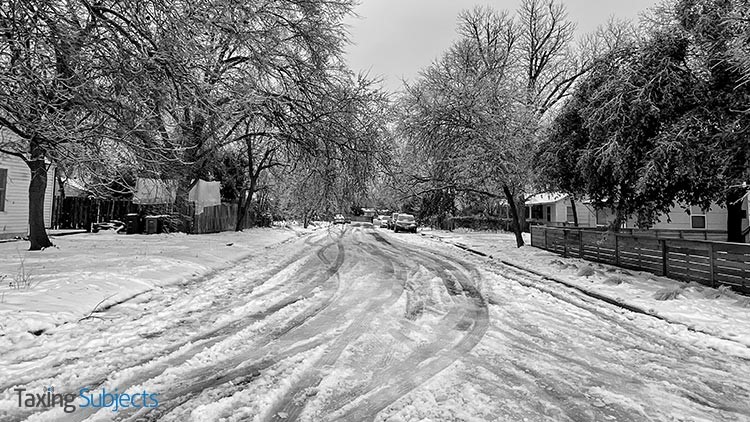
Texas taxpayers impacted by this month’s brutal winter storms are getting some help from the Internal Revenue Service. The help includes extended deadlines and other relief measures.
The entire state of Texas is included disaster declaration issued by the Federal Emergency Management Agency (FEMA) and the IRS’ relief measures apply to all the counties in the FEMA declaration.
Any counties outside of Texas that are added to the disaster declaration will automatically qualify for the IRS relief package as well. The list of eligible counties and localities is available on the disaster relief page on IRS.gov.
Extension to file and pay
The tax relief announcement postpones various tax filing and payment deadlines that kicked in with the beginning of the filing season on Feb. 11. For Texas taxpayers, affected individuals and businesses now have until June 15, 2021, to file their returns and pay any tax originally due during the period.
The extension includes 2020 individual and business returns normally due on April 15, as well as the various 2020 business returns that would have been due on March 15. It also means affected Texas taxpayers now have until June 15 to make 2020 IRA contributions.
Also included in the relief package are quarterly estimated income tax payments normally due April 15, and quarterly payroll and excise tax returns normally due April 30. The extension also applies to tax-exempt organizations operating on a calendar-year basis, that have a 2020 return due on May 17.
Penalties on payroll and excise tax deposits due on or after Feb. 11 and before Feb. 26 will be abated as long as the deposits are made by Feb. 26.
The IRS disaster relief page has details on other return types, payments and tax-related actions qualifying for the additional time.
Tax relief is automatic
Taxpayers do not need to contact the IRS in order to qualify for the extensions and other relief. As long as the taxpayer’s address of record is in the federally declared disaster area, the extended deadlines are automatically applied.
If an affected taxpayer gets a late-filing or late-payment penalty notice from the IRS that has an original or extended filing, payment or deposit due dat that falls within the postponement period, the taxpayer should call the phone number printed on the notice to have the penalty abated.
An IRS statement says the agency is ready to help those taxpayers who may have affected by the winter storm but who live outside the current disaster area.
“The IRS will work with any taxpayer who lives outside the disaster area but whose records necessary to meet a deadline occurring during the postponement period are located in the affected area. Taxpayers qualifying for relief who live outside the disaster area need to contact the IRS at 866-562-5227. This also includes workers assisting the relief activities who are affiliated with a recognized government or philanthropic organization,” the IRS states.
Declaring losses
Individuals or businesses in a federally declared disaster area who suffered uninsured or unreimbursed disaster-related can claim them on either the return for the year the loss occurred (in this case, the 2021 return normally filed next year), or the return for the prior year. Taxpayers can, if they choose, claim these losses on the 2020 return they fill out this tax season.
Be sure to write the FEMA declaration number—4586—on any return claiming a loss.
The tax relief package is part of a coordinated federal response to the damage caused by this winter storm and is based on local damage assessments by FEMA. For more information on disaster recovery, visit disasterassistance.gov.
Source: IR-2021-43
